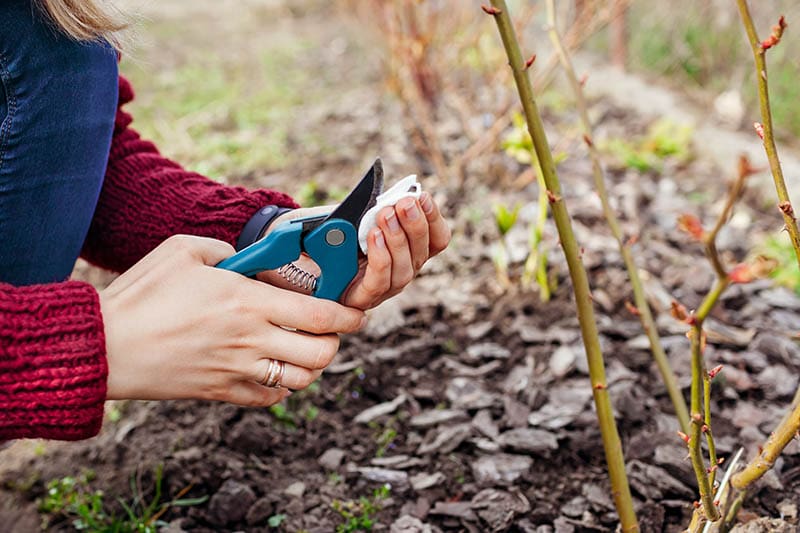How to Get Rid of Chipmunks in the Garden: 4 Humane Ways
-
Pete Ortiz
- Last updated:

Chipmunks are cute critters that can be found all over North America. Despite their jovial appearance, chipmunks can be a huge nuisance for homeowners. They can dig up yards, eat gardens and leave a mess around your home. For these reasons, many people end up looking for ways to get rid of chipmunks from their property. Some advice says to simply shoot them with low caliber rifles, but that is not humane. Few people want to kill chipmunks; they just want them to go away.
There are numerous ways to humanely remove chipmunks from an area without harming or killing them. Here are four proven humane ways to get rid of chipmunks from a garden.
The 4 Humane Ways to Get Rid of Chipmunks in the Garden
1. Use Repellents
One of the simplest and most humane ways to get rid of chipmunks is to repel them. Repellents come in a variety of different types and have a variety of different benefits. Repellents work by polluting the area with scents, vibrations, sounds, and foods that chipmunks hate. Instead of seeing a juicy garden to hole up in a chipmunk, they will see a wasteland with nothing to offer them. Repellents are great because they are usually affordable, effective, and completely humane.
There are three main types of repellents to look into.
Electronic Repellents
Electronic repellents are some of the most advanced and high-tech. They are also some of the most expensive options. Electronic repellents use a series of modern methods to spook chipmunks from your garden. Two of the most common forms of electronic rodent repellent include ultrasonic repellents and water jet sprayers. The ultrasonic repellents use a specific noise that penetrates the air and bothers chipmunks. These sounds are often at a frequency that people cannot hear but are extremely annoying for chipmunks and other animals.
Water sprayers work by spraying water to scare off chipmunks when they come too close to your prized vegetables. Before using a water sprayer, check the label. Some sprayers come with chemicals and pesticides designed to harm as well as scare rodents. You will want a sprayer that does not use any chemicals. These systems can effectively cover a garden, but they need a power source to operate.
Dry Repellents
Dry repellents include powders, spices, and other solid repellents. Some of the most common types of dry repellents that work great for chipmunks include cayenne pepper, mothballs, and even human hair. The scent of humans is a powerful repellent all on its own. You can also buy safe, natural dry repellent online to sprinkle around your garden. Sprinkle, place or bury dry repellents around areas where you have seen evidence of chipmunk activity to dissuade them from returning.
Some dry repellents are as simple as sprinkling crushed red pepper around your garden beds, while others are complicated scientific mixtures designed for long release and to survive contact with rain.
Liquid Repellents
Liquid repellents are similar to dry repellents, except they are sprayed rather than sprinkled. Liquid repellents do not last as long as dry repellents, but they can still be very effective. Some liquid repellents that work on chipmunks include hot sauce, pepper spray, and rodent defense sprays. Spray these repellents around the base of vulnerable plants, around the perimeter of your home, or along the property line where you suspect chipmunks are coming in. Once they come into contact with these potent repellents, they will think twice before proceeding.
You can buy premixed repellents or create your own. Some mixtures simply require soap, water, pepper, and olive oil. You can mix these household items and put them in your spray bottle for an affordable repellent.
2. Create Barriers

If repellents do not appeal to you, you can also try creating barriers. Chipmunks will only enter a garden if they feel safe and free to do so. Creating a barrier to entry could be enough of an obstacle that the chipmunks will simply look for an easier place to live. There are a variety of different barriers that you can potentially construct to keep chipmunks away from your garden.
Fencing
Putting up a simple garden fence can sometimes do the trick. A fence will hinder the view of the garden, create an unsafe place for chipmunks to climb, and will impede free movement between outdoor areas. Chipmunks typically want to travel under cover and forcing them to climb a fence forces them to be in the open, which goes against their instincts. A chipmunk is easily spotted by predators such as cats and birds when they are on a fence as opposed to under some dead leaves. A simple fence is a great way to put a barrier around your garden without resorting to other methods you might not be comfortable with.
Garden Cloth
Garden cloth is a great way to keep chipmunks out of your garden. Burying garden cloth in an L-shape can prevent chipmunks from burrowing. Chipmunks love to burrow. If the rodents can get to the roots of your plant or create safe tunnels and dens for themselves, they are much more likely to move on rather than settling down. You can put garden cloth around your favorite plants and around your home’s perimeter to prevent chipmunks from burrowing down or upward into your yard.
Chicken Wire
Chicken wire is another proven method for keeping pests out of an area. Chipmunks love to find small holes in your home’s foundation, fencing, and existing lattice. If you have any areas or holes that you suspect are being used by small critters to get around, you can simply plug them with chicken wire. Chicken wire is tough enough and narrow enough to prevent most animals from getting through. It is also cheap, easy to use, and completely humane.
3. Trap and Release Them
Another method to try is trapping. You can buy small rodent traps at most local hardware stores that are designed to lure and capture rodents such as chipmunks and squirrels. If you trap chipmunks and release them in a new area, it could be enough to keep them away from your property permanently. Buying the traps can sometimes get expensive, and they require a little bit of knowledge and practice to master. Despite the learning curve and initial cost, trapping is a tried-and-true method for pest removal.
Look Up Local Laws
Before you run off and attempt to trap your first chipmunk, you should look up your local laws and regulations regarding nuisance trapping. Every community has different rules governing what you can and cannot do to trap animals. There are also rules about where and when you can release the animals. Some counties require permits or licenses to operate animal traps.
If you are simply trying to remove a couple of chipmunks from your yard, you are unlikely to have a run-in with the law, but it is possible. Improper trapping can result in municipal fines or even a ticket. Improper releases can also result in penalties. Before trapping and releasing any sort of nuisance animal, the most responsible thing to do is to look up the rules for your county beforehand.
4. Clean Up the Garden

One of the simplest ways to try and remove chipmunks from a garden is to clean up the area and remove anything that might be attracting the chipmunks. One of the things that will quickly attract unwanted chipmunks is a bird feeder. Birds and squirrels drop delicious seeds on the ground where chipmunks emerge to find them. If chipmunks believe they can come and get free seed from under your feeder, they will start hanging around your garden. Remove bird feeders, other sources of seed, food scraps, old plants, and debris. Without a good source of food, water, and shelter, chipmunks will not have any reason to enter your garden in the first place.
Chipmunks are naturally fearful creatures, and they like to enter an area via enclosed and covered avenues. If you remove rocks, shrubs, vines, leaves, and other things that chipmunks can easily hide, the prospect of crossing an open lawn might be too terrifying for the chipmunks to consider.
Intruders vs. Infestations
There is a difference between deterring a few lone chipmunks and dealing with a full-blown infestation. Some of these methods are not sufficient to dislodge a chipmunk colony from your property. Chipmunks burrow underground and can breed beneath your feet and out of sight. Soon, two chipmunks can turn into twenty, and that can be a huge problem.
If you suspect that you are dealing with an infestation that is out of your control, you might need to call in professional help. Chipmunk nests and burrows will need to be located and treated in order to get rid of the problem once and for all.
Many of the solutions on this list will prevent an infestation from taking root, but if you start the process too late, a few repellents and some wire might not be enough to manage multiple nests that could be present underground.
 In Conclusion
In Conclusion
You do not have to harm any chipmunks in order to remove them from your garden. Chipmunks can be a nuisance, but they are easily driven away. There are a variety of humane methods for chipmunk removal that can work in any garden. You can get rid of chipmunks from a garden using simple barriers, red pepper, a small trap, or just by removing your bird feeder. The best option for your garden will depend on several individual factors.
Featured Image Credit: Pixabay
Contents



